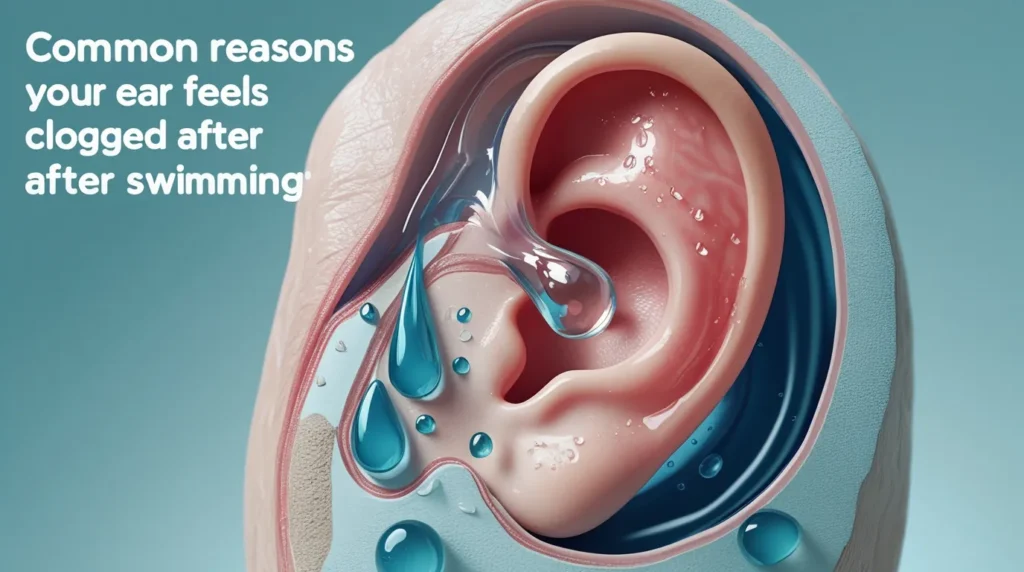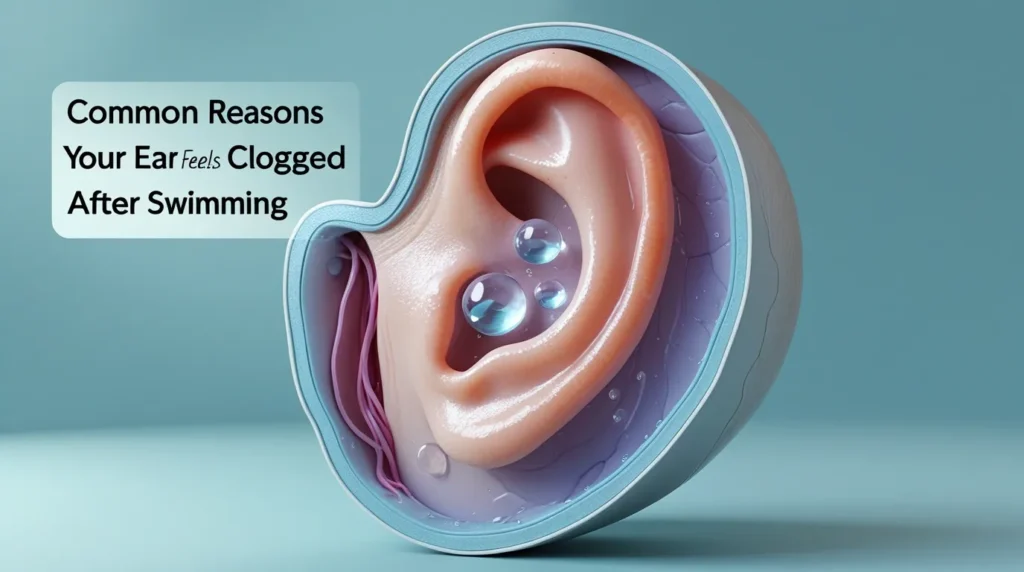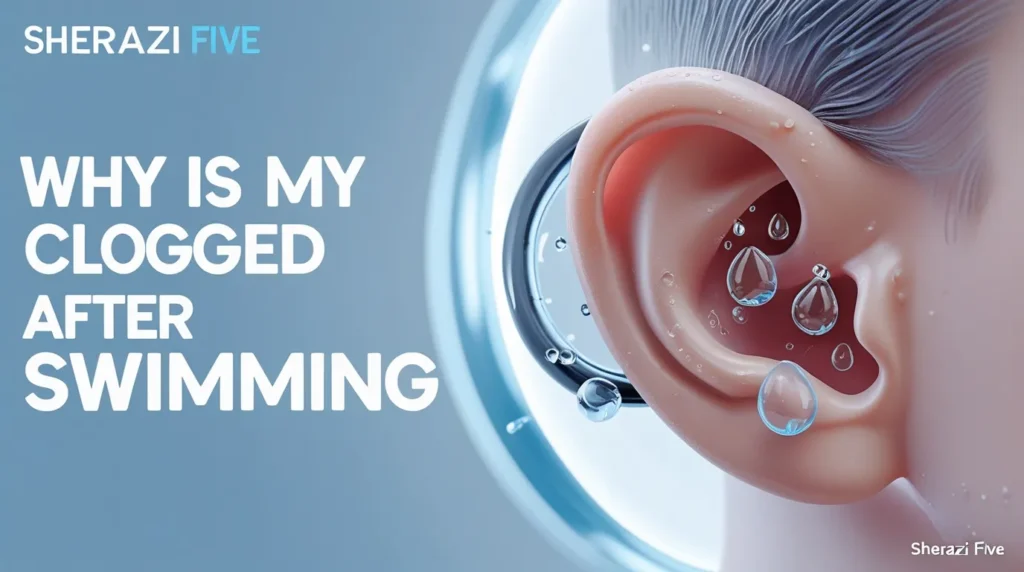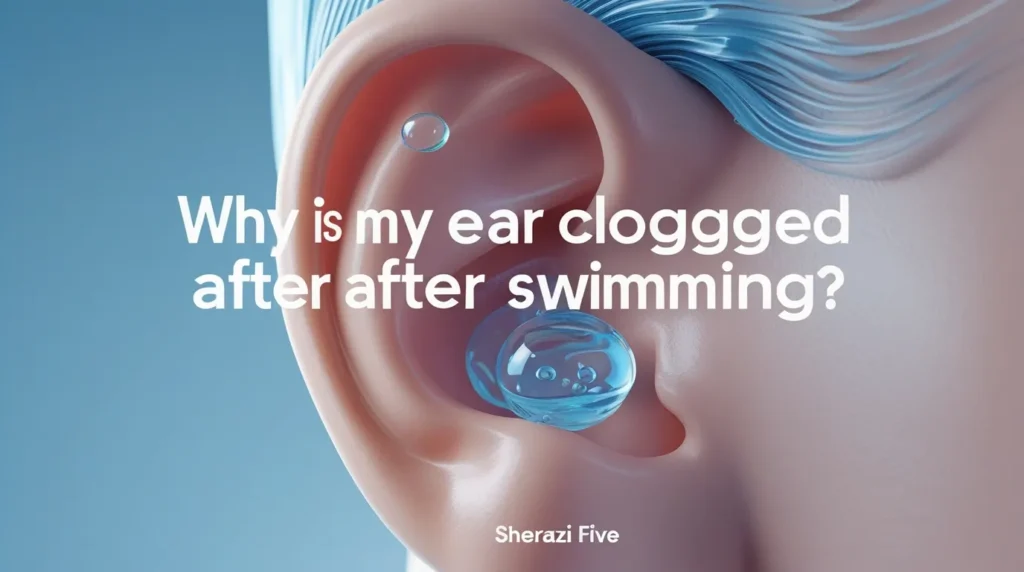Have you ever finished a fun day at the pool or the beach and noticed that your ear suddenly felt blocked? Many people ask, “Why is my ear clogged after swimming?” This common issue happens when water gets trapped in the ear canal or when earwax buildup makes it harder for moisture to drain. If you don’t clear it out safely, the trapped water can lead to swimmer’s ear infection, which can be both painful and annoying.
Understanding the causes, symptoms, and safe ways to treat this problem can save you from discomfort — and sometimes from a doctor’s visit. Let’s explore why it happens, how to unclog your ears, and how to prevent it in the future.
Common Reasons Your Ear Feels Clogged After Swimming

Many swimmers experience a clogged sensation after spending time in the pool or ocean. The most frequent cause is water trapped in the ear. When you dive, splash, or even float, water can flow into the narrow ear canal and sometimes stay there.
Another common reason is earwax buildup. Normally, earwax protects your ears by keeping them clean and moist. But if there’s too much wax, it can trap moisture behind it. Sometimes, even changes in ear pressure after swimming or skin swelling due to moisture can create that clogged feeling.
When people ask, “Why is my ear clogged after swimming?”, it often comes down to a combination of trapped water and earwax. The key is to address it safely before it leads to infection.
How to Safely Unclog Your Ears After Swimming

If you feel your ear is blocked, you don’t need to panic. There are several safe ways to unclog your ears after swimming.
Start by gently tilting your head to one side and pulling on your earlobe. This straightens your ear canal and lets the water drain out naturally. Another simple trick is to dry the outer ear with a soft towel — but avoid sticking it inside the canal.
You can also use the lowest setting of a hairdryer, keeping it at least a foot away, to help evaporate trapped moisture. Many people find relief by using ear drying drops, available at most drugstores. If you prefer a natural approach, a mixture of equal parts white vinegar and rubbing alcohol can be used as homemade drops — but only if your eardrum isn’t ruptured.
Remember: Never insert cotton swabs, fingers, or sharp objects into your ear. Doing so can push water or wax deeper, irritate the canal, or even damage your eardrum.
Signs of Swimmer’s Ear (Otitis Externa)
Sometimes, the reason why your ear is clogged after swimming isn’t just trapped water. You may have developed swimmer’s ear infection. This happens when moisture creates an ideal environment for bacteria or fungi to grow in the outer ear canal.
Early symptoms often include itchy ear canal and slight redness. As the infection progresses, you might feel pain when you tug your earlobe or push the small bump in front of your ear. Some people also notice clear fluid draining from the ear canal.
Here’s a quick table to help you recognize the signs:
| Symptom | What It Means |
|---|---|
| Persistent itching | Early sign of infection |
| Redness inside ear | Irritated skin from bacteria growth |
| Pain when pulling earlobe | Possible swimmer’s ear |
| Fluid drainage | Indicates moderate or severe infection |
If you notice these symptoms, it’s important to see a doctor. They can prescribe antibacterial or antifungal eardrops that clear the infection and reduce swelling.
When to See a Doctor for a Clogged Ear

While many cases of clogged ears after swimming resolve on their own, there are times when medical attention is necessary. Seek professional help if your ear remains clogged for more than a couple of days or if you experience severe pain, hearing loss, fever, or foul-smelling discharge.
You should also be extra cautious if you have a ruptured eardrum or ear tubes. In such cases, you should never use over-the-counter drying drops or homemade remedies without consulting your doctor.
Understanding when to get help can prevent minor discomfort from turning into a serious outer ear infection.
Best Prevention Tips to Keep Ears Dry
As the saying goes, prevention is better than cure. Avoid asking yourself later, “Why is my ear clogged after swimming?” by taking a few smart precautions.
Before entering the water, consider wearing earplugs for swimming and a snug-fitting swim cap. These create a barrier that keeps water out. If you’re taking a bath or shower, you can gently place cotton balls coated with petroleum jelly in the outer ears.
If you’re someone who sweats a lot or uses earbuds frequently, remove them occasionally to let your ears breathe. This prevents moisture buildup in the ear canal. Regularly visiting your doctor to remove excess earwax buildup can also make a big difference.
Home Remedies vs. Medical Treatment
Many people try home remedies for clogged ear before going to a clinic, and that’s often fine — as long as you do it safely. Simple techniques like head tilting, gentle drying, and using store-bought or vinegar-alcohol drops (for those without eardrum issues) are effective for most cases.
However, if you notice worsening symptoms such as persistent ear pressure after swimming, continuous pain, or fluid drainage, it’s time to seek medical care. A doctor can examine your ear canal, remove wax if needed, and prescribe eardrops that target the infection directly.
Knowing the difference between home care and when to see a doctor ensures that you get the right treatment at the right time.
Common Mistakes That Make a Clogged Ear Worse

It’s tempting to grab a cotton swab when your ear feels blocked, but that’s one of the biggest mistakes. Cotton swabs often push moisture or wax deeper into the ear canal, increasing the risk of infection.
Another common error is using hydrogen peroxide or alcohol-based drops when you have a ruptured eardrum or ear tubes. This can irritate or damage the delicate tissue inside your ear. Avoid inserting fingers, pens, or any other objects — these can scratch your ear canal and lead to further complications.
Understanding these mistakes can save you from prolonged discomfort and unnecessary trips to the doctor.
Key Takeaways on Why Your Ear Gets Clogged After Swimming
To sum up, the main reason behind why your ear is clogged after swimming is water trapped in the ear canal, often worsened by earwax buildup. If ignored, it can lead to swimmer’s ear infection, which causes pain, redness, and fluid drainage.
The good news is that most cases are preventable. Use safe drying techniques, avoid harmful habits like poking your ears, and protect your ears during swimming with earplugs and a swim cap. Prevention, combined with knowing when to seek help, keeps your ears healthy and your swimming experiences worry-free.
Piriformis Syndrome Won’t Go Away Causes, Relief, and Long-Lasting Solutions
FAQs
1. How do I unblock my ears after swimming?
Tilt your head to the side, gently pull your earlobe, or use safe ear drying drops. Avoid cotton swabs or fingers inside the ear.
2. How long does a blocked ear from swimming last?
Usually a few hours to a day if water is trapped. Persistent blockage may need medical attention.
3. How to relieve ear pain while pregnant?
Use a warm compress outside the ear, stay hydrated, and consult your doctor before using any drops.
4. What is the difference between a clogged ear and a swimmer’s ear?
A clogged ear usually has trapped water or wax; swimmer’s ear is an infection causing pain, redness, and discharge.
5. How painful is a swimmer’s ear?
Pain can range from mild itching to severe throbbing, especially when pulling the earlobe.
6. Does yawning help remove ear water?
Yawning can help equalize ear pressure and sometimes release trapped water.
7. Why can’t I hear out of my ear after swimming?
Water or wax can block the ear canal, temporarily muffling sounds until the blockage clears.
8. Can swimming damage your ears?
Repeated water exposure or poor drying can lead to swimmer’s ear or ear canal irritation, but swimming itself is usually safe.
9. How do you get rid of a clogged ear?
Tilt your head, gently pull your earlobe, try safe drying drops, or see a doctor if it persists.
10. Does chewing gum help release trapped water?
Chewing can move the jaw and open the Eustachian tube, helping water drain from the middle ear.
11. Will water eventually come out of the ear?
Yes, most trapped water drains naturally within hours, especially if you tilt your head or gently move your jaw.
12. Can tilting my head get water out?
Yes, tilting your head toward the side of the blocked ear and gently tugging the earlobe often helps.
13. What can be mistaken for swimmer’s ear?
Clogged ear from wax, sinus pressure, or middle ear infection can mimic swimmer’s ear symptoms.
14. How to know if an ear infection has spread to the brain?
Seek urgent medical care if you have severe headache, fever, nausea, confusion, or vision changes.
15. Can a swimmer’s ear heal on its own?
Mild cases may improve naturally, but most need ear drops to prevent worsening infection.
16. How long is too long for water in ear?
If water stays in the ear longer than 1–2 days, see a doctor to prevent infection.
17. How do doctors remove water from ears?
Doctors may use gentle suction, ear irrigation, or prescribe drying drops depending on the situation.
18. What does a swimmer’s ear look like?
Red, swollen ear canal, sometimes with clear or yellow fluid, and visible irritation or redness around the ear.





Pingback: Differences Between Hospice Care Vs Palliative Care